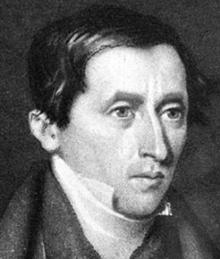- Home
- Archival Material
- College History Projects
- Subject-Based Digital Projects
George Duffield III (1794-1868)

George Duffield III was born on July 4, 1794 in Lancaster County, Pennsylvania. His father, George Duffield, Jr., served as the Comptroller General of Pennsylvania. The younger Duffield studied at the University of Pennsylvania, obtaining a degree in 1811. He then pursued a four-year course of study at the Theological Seminary of the Reformed Church in New York. His teacher and founder of the Seminary, John Mitchell Mason, would later become president of Dickinson in 1821. After completing his studies at the Seminary, Duffield was officially licensed to preach and entered the Presbyterian ministry on April 20, 1815. In September 1816, Duffield visited the town of Carlisle and was invited to preach at the First Presbyterian Church on the town square. His preaching style charmed the congregation, which uncharacteristically united in calling Duffield to lead their church. By accepting their call, Duffield achieved what his grandfather, the noted revivalist of the First Great Awakening, George Duffield, had failed to do during his time in Carlisle nearly fifty years before.
As he took on the work of the parish, Duffield began to develop views similar to the more active and emotional doctrines of “new light” Presbyterianism. Eventually he yielded to the more personal approach of the revivalist preacher. After the death of President Mason’s alumnus son, James, in November 1822, Duffield led a series of revivals that boosted interest in the ministry among Dickinson students. Eighteen of the students who experienced these revivials later entered the ministry.
In 1820, Duffield was named to the Dickinson Board of Trustees. His “new light” views caused problems in his dealings with both the Board and the Presbytery of Carlisle. George Armstrong Lyon, a Presbyterian member of the College Trustees, led a long and fractious campaign against Duffield and his doctrinal views. In 1832, the local Presbyterian Church split into two rival congregations, with Lyon and some seventy families leaving Duffield’s faction. In the same year, Duffield came under harsh criticism for views set forth in his book Duffield on Regeneration. The local Presbytery denounced the work and charged him with heresy. The ensuing trial was long and divisive, leaving the Presbyterians of Carlisle hopelessly split; the two sides would not rejoin for one hundred and fifty years.
Duffield resigned from the Board of Trustees during the Methodist takeover in 1833. After his trial had ended and he had been dismissed, on March 23, 1835 he left the pulpit of the First Presbyterian Church. In October 1838, he was installed as pastor of the First Presbyterian Church in Detroit, Michigan, where he remained for thirty years, always supporting the "New School." Duffield collapsed while speaking to the International Convention of the Y.M.C.A. in Detroit and died forty-eight hours later on June 26, 1868, a week short of his seventy-fourth birthday.
Date of Post:
2005
College Relationship:
Trustee - Years of Service:
1820-1833